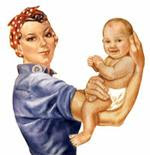Check out the interesting article I found out at itzbigblog.com. Generational Stereotypes are out there, and while I'm not a believer in placing labels it's still a common topic and sticking point for a large number of recruiters and hiring managers. I am from the Generation X camp and will say that often times I feel like I'm having to constantly prove myself and my worth just because I'm the same age as someones daughter.
I think it's important to take a step back and evaluate the situation. I've done a lot of research and read several books and articles that discuss the so-called differences between generations. While I personally do my best to not make assumptions, it's good business to understand the people you are working with and for.
Next time-Sales and Your Job Search
****************************************************
Generational Workplace Woes: Geezers vs. Geeks
As a result of efforts to retain aging workers longer and to fill the new jobs being created as well as replace retiring workers, the workforce is becoming much more multigenerational. Today, we have four distinct generations sharing the workplace: the "Traditional" older workers, the Baby Boomers, Generation X, and Generation Y (also called the "Millennials" or the "Net" generation.) This means that the workplace will be increasingly characterized not just by an aging workforce, but also by increased age diversity.
According to a survey by Lee Heckt Harrison, more than 60% of employers say they are experiencing tension between employees from different generations. The older generation has always complained about the younger one, but, in the modern workplace, the misunderstanding works both ways. Today, you might have a fresh college graduate managing a person thirty, or even forty years older! It can be difficult, on both sides, to handle the disparities of this reality.
I recently overheard the following discussion that summed up the problem. Common conversation between "seasoned" workers is that "I can't find young people to put in a good week's work anymore" (aka - 60-hour work week). To that young Millenials reply: "I will work 60 hours if I have too!" What Gen Ys are really saying is "I'm sorry it takes you 60 hours to complete in what takes me only 40 hours." Gen Ys will work long and hard - they just don't want it to be a way of life.
This generational "crowding" is making for some major conflict and miscommunication in the workplace. That's because each generation has its own distinct set of values, shaped by their unique social conditions, political events, economic conditions, major crises and childhood experiences. Each generation also reacts to the generation before them, and this reaction becomes part of its own identity and defining characteristics. These differences can lead to major misunderstandings between coworkers raised in different eras.
Authors Warren Bennis and Robert Thomas have their own unique view of this situation. They see the generation gap as being between what they call the "geeks" (the younger, "digital" generations) and the "geezers" (the older, "analog" generations.) The analog world in which today's older generations grew up was primarily linear. It rewarded specialization and experience, followed a mechanical understanding of the world, and favored organizational hierarchy. The digital world of the younger generations is nonlinear; it favors a flat organizational structure and rewards the generalist with the beginner's mind. Rather than a mechanical view of the world, it favors a more fluid and changing "living systems" model. This is a major paradigm shift that increasingly divides different generations in the workplace.
Managing this conflict, and finding ways to value the unique contributions made by these four unique generations in the workforce, will be a challenge for all businesses in the future. To learn more about bridging generational gaps and reducing workplace conflict, got to http://www.super-solutions.com/generationalstyleassessment.asp or call 800.803.4303.
skip to main |
skip to sidebar

Preparation is Key

Black or Grey Suit is Best

tips and tricks for those on the job hunt. how to get noticed!! learn the unwritten rules of the job search from a professional recruiter and networker.
Research Dresscode Prior to Interview

Preparation is Key
Keyword Search ME!
Classic Interview Attire

Black or Grey Suit is Best
My Upcoming Events. . .
Twitter Updates
About Me

- Jessica
- I am currently recruiting for professional positions in the Oklahoma City Metro.


